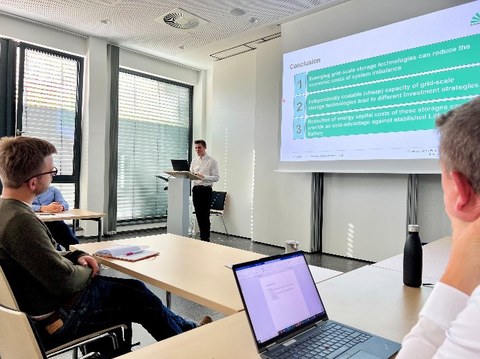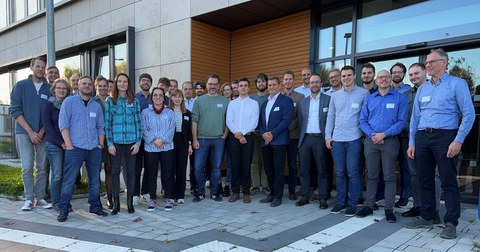Dec 16, 2024
Meeting of the Environment and Energy Working Group on "Transformation paths to a green economy: challenges and OR-applications"
The transition to more sustainable consumption and production and thus to a green economy is subject to various challenges. Operations research makes it possible to model the various processes, decisions and interactions between economy, ecology and social issues and to analyse the effects of technological and regulatory measures using a methodological approach. This enables a better understanding of the successful design of necessary transformation pathways.
Against this backdrop, more than 30 scientists from Germany gathered at the FernUniversität in Hagen for the Energy and Environment Working Group (AG Energie und Umwelt) meeting on October 23 and 24. The two-day workshop was hosted by Prof. Michael Bucksteeg and Prof. Karsten Kieckhäfer, who designed the programme together with Prof. Dominik Möst and Dr. Hannes Hobbie from TU Dresden. The aim of the working group meeting was to bring together scientists from different areas of modelling transformation pathways towards a green economy in order to achieve a better understanding of the technical and economic challenges.

Presentation by Jonathan Stelzer from KIT
The working group's annual workshop is designed to allow junior researchers sufficient time for their presentations and subsequent discussion. A special feature of the workshop is the presence of many experienced scientists who provide valuable feedback and suggestions to the junior researchers in a constructive atmosphere. This results in an intensive exchange that promotes further scientific development.
The event began with a presentation by Jonathan Stelzer from Karlsruhe Institute of Technology on the possibilities for optimising the Energy-to-Power Ratios of new grid-connected storage systems. Berit Hanna Czock from the University of Cologne examined the economic efficiency of splitting the German bidding zone market and highlighted the advantages and disadvantages of such a measure. Delic Mensur from the FernUniversität in Hagen discussed the so-called Solar Rebound Effect and examined its impact on the energy system using an optimisation model. After a short coffee break, Viktor Schüßler from the Ruhr University Bochum presented a life cycle analysis of a reference plant for lime production and examined the effects of replacing fossil fuels with green hydrogen. Prof. Dr. Christian Thies from the Technical University of Hamburg then gave insights into simulation analyses of the decarbonisation of car fleets in Germany, Poland and Norway, shedding light on the greenhouse gas emissions and energy requirements of this transformation. After another coffee break, David Wohlleben from the University of Cologne discussed the potential and pricing processes of a global hydrogen market in an oligopolistic Cournot model. The first day concluded with a presentation by Bastian Weißenburger of Fraunhofer ISI, who presented a model for the development of an international hydrogen economy for Europe and the MENA region. It was clear how such a system could contribute to a sustainable energy supply. In the evening, workshop participants rounded off the day together at the Artischocke restaurant in Hagen city centre.

